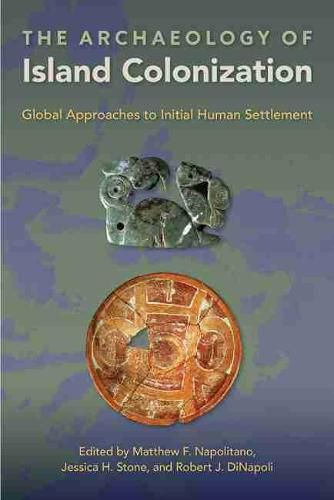Readings Newsletter
Become a Readings Member to make your shopping experience even easier.
Sign in or sign up for free!
You’re not far away from qualifying for FREE standard shipping within Australia
You’ve qualified for FREE standard shipping within Australia
The cart is loading…






This title is printed to order. This book may have been self-published. If so, we cannot guarantee the quality of the content. In the main most books will have gone through the editing process however some may not. We therefore suggest that you be aware of this before ordering this book. If in doubt check either the author or publisher’s details as we are unable to accept any returns unless they are faulty. Please contact us if you have any questions.
This volume details how new theories and methods have recently advanced the archaeological study of initial human colonization of islands around the world, including in the southwest Pacific, the Mediterranean, the Caribbean, and Southeast Asia. This global perspective brings into comparison the wide variety of approaches used to study these early migrations and illuminates current debates in island archaeology.Evidence of island colonization is often difficult to find, especially in areas impacted by sea level rise, and these essays demonstrate how researchers have tackled this and other issues. Contributors show the potential of computer simulations of voyaging in determining the range of timing and origin points that were possible in the past. They discuss how Bayesian modeling helps address uncertainties and controversies surrounding radiocarbon dating. Additionally, advances in biomolecular techniques such as ancient DNA (aDNA), paleoproteomics, analysis of human microbiota, and improved resolution in isotopic analyses are providing more refined information on the homelands of initial settlers, on individual life courses, and on population-level migrations.
Islands offer rich opportunities to examine the exploratory nature of the human species, providing insights into the evolution of watercraft technologies and wayfinding, the impact of humans on their new environments, and the motivations for their journeys. The Archaeology of Island Colonization represents the innovative ways today’s archaeologists are reconstructing these unique paleolandscapes.
$9.00 standard shipping within Australia
FREE standard shipping within Australia for orders over $100.00
Express & International shipping calculated at checkout
This title is printed to order. This book may have been self-published. If so, we cannot guarantee the quality of the content. In the main most books will have gone through the editing process however some may not. We therefore suggest that you be aware of this before ordering this book. If in doubt check either the author or publisher’s details as we are unable to accept any returns unless they are faulty. Please contact us if you have any questions.
This volume details how new theories and methods have recently advanced the archaeological study of initial human colonization of islands around the world, including in the southwest Pacific, the Mediterranean, the Caribbean, and Southeast Asia. This global perspective brings into comparison the wide variety of approaches used to study these early migrations and illuminates current debates in island archaeology.Evidence of island colonization is often difficult to find, especially in areas impacted by sea level rise, and these essays demonstrate how researchers have tackled this and other issues. Contributors show the potential of computer simulations of voyaging in determining the range of timing and origin points that were possible in the past. They discuss how Bayesian modeling helps address uncertainties and controversies surrounding radiocarbon dating. Additionally, advances in biomolecular techniques such as ancient DNA (aDNA), paleoproteomics, analysis of human microbiota, and improved resolution in isotopic analyses are providing more refined information on the homelands of initial settlers, on individual life courses, and on population-level migrations.
Islands offer rich opportunities to examine the exploratory nature of the human species, providing insights into the evolution of watercraft technologies and wayfinding, the impact of humans on their new environments, and the motivations for their journeys. The Archaeology of Island Colonization represents the innovative ways today’s archaeologists are reconstructing these unique paleolandscapes.